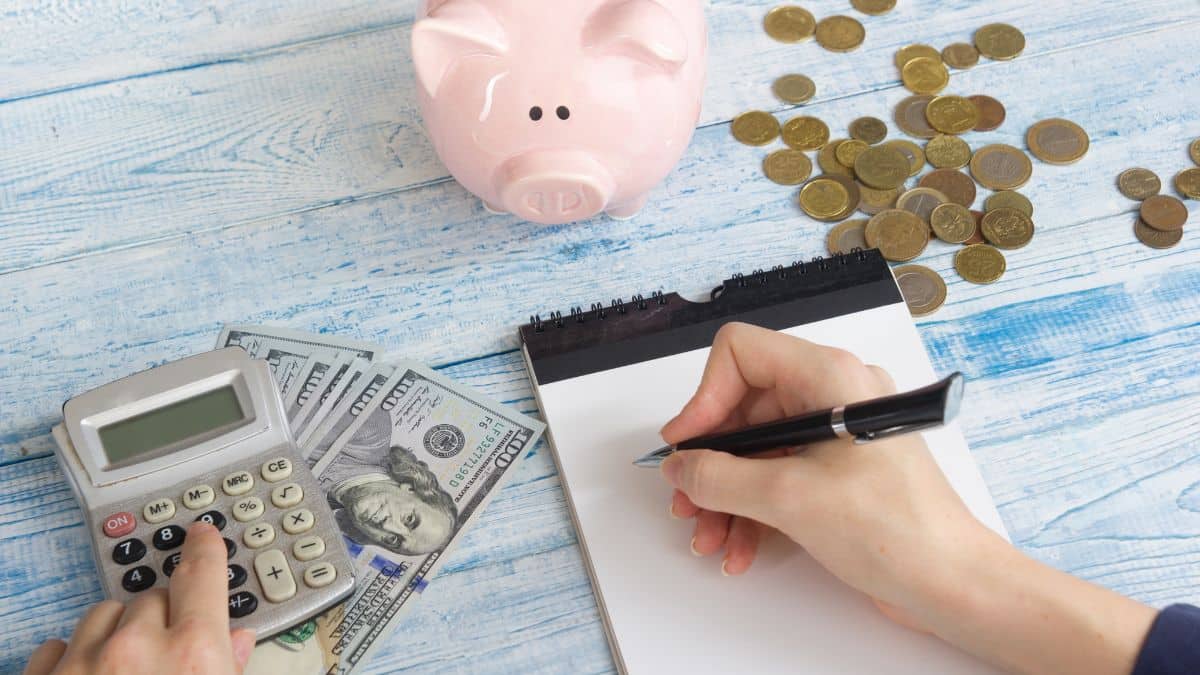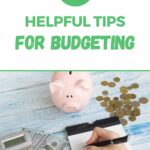Learning to budget can be a daunting–and sometimes intimidating-task. Wouldn’t it be great if you had a list of some of the most helpful tips for budgeting?
Budgeting doesn’t have to be tedious. In fact, when your budget is designed in a way that caters to your personality, your goals and your schedule, you might just find that budgeting is…dare I say it….fun!
Top Budgeting Tips
If you’ve been wanting to start budgeting, or searching for a way to make your budget more effective, this list was created with you in mind.
Use some or all of the tips listed here to help design a budget that’s perfect for you and your financial situation.
1. Start by Determining Your Goals
Goals are the key to any successful budget. Why? As Tony Robbins once said, “Setting goals is turning the invisible into the visible.”
When you determine exactly what your financial goals are and then make a written plan to get there, your chances of reaching those goals are increased exponentially.
Decide now what your financial goals are. Do you want to achieve financial independence by age 40? Pay your house off in five years?
Save enough to pay for your kid’s college education? Set a few hours aside and think seriously about what you want for your finances now and then in 5, 10, and 20 years.
Then, get to work creating a budget that will help you reach those goals.
2. Use a Zero Sum Budget
If you’re serious about achieving your financial goals, you need to consider the zero-sum budget.
The zero sum budget is a revolutionary budgeting tool that goes overlooked far too often. Let’s start with a definition: A zero sum budget is a budget that gives every dollar you earn a purpose.
When you don’t give every dollar you earn a purpose, you run the risk of wasting far too much money, which can impact your finances negatively in a painful way.
Let me show you how with a story. Let’s say that after Bob makes his budget, Bob has $300 a month that he has not assigned a purpose for.
You can pretty much guarantee that Bob’s unassigned funds will disappear into what I like to call the “black hole of spending”. Bob will spend it on fast food runs, extra drinks on nights out or random items at the local big box store.
But what if Bob had assigned that $300 a month a job in his investment account? If Bob chose to ignore that $300 instead of investing it, he’d potentially be giving up over $136,000.
Don’t be like Bob. Use the zero sum budget and assign extra funds to investments, paying off debt or other financial goals.
3. Pay Yourself First
If I were to narrow this list down to one rule, it would be to pay yourself first. Treating your savings deposits like a bill and paying yourself first can be the budgeting tip to overcome all other budgeting failures.
How? First, it’s important to pay yourself in a way that’s non-negotiable, and to do so ahead of all other bills.
It honestly doesn’t matter how much you pay yourself, although more is always better. Make it a point to stretch yourself just a bit when it comes to how much you put into savings each month.
When you develop a habit of saving something out of every paycheck, you’ll create a cushion that can help you overcome almost any negative financial choices.
The key is to put some money into your savings each and every paycheck over a long period of time. Then, leave it there. Don’t remove it unless there’s a true financial emergency that can’t be overcome by any other plan.
4. Consider Cash Envelope Tools
Cash envelopes for fluid expenses such as groceries, entertainment, clothing and personal care are an oft-overlooked valuable budget tool.
The digital world we live in has made it “convenient” to swipe a card or point your phone to an electronic pad and pay for everything.
However, along with that convenience has come a disconnect with money. It’s quite easy not to view that tap-to-pay or swipe-to-pay option as money leaving your hands.
Knowing how to use a cash envelope system helps your budget in two powerful ways. First, it helps you better understand the magnitude of spending (or not spending) your money.
Second, using cash envelopes helps you stick within the budgeted amount for a given expense category.
For instance, when you run your grocery budget with a set amount of cash for the week, it’s easier to “see” what you’re spending. It’s also easier to live within your budget, knowing that once a set budget amount is gone, you’re done spending in that area for that budget cycle.
Note: these cash envelope wallets make using the cash envelope system easy and fun. Not a big fan of carrying cash?
Consider using a digital cash envelope app like Qube.
5. Budget for Occasional Expenses
Occasional expenses such as gifts and car repairs are often what throws a budget off track. That being said, there is an easy way to make sure that occasional expenses don’t derail your budget.
Instead of simply paying those expenses when they come up, set aside money each month into a fund used specifically for those expenses.
As an example, write down who you buy gifts for each year and how much you spend on those gifts.
Let’s say you buy birthday gifts for 15 people you know each year, and you spend $60 on each gift. That adds up to $900 per year on gifts. Divide that $900 by 12.
Now you know you’ve got to put $75 into a “gift-giving” fund each month. No more unexpected surprise expenses that throw your budget out of whack.
Do the same with an estimated amount for car repairs, clothing, or any other occasional expenses you may have.
Revisit the budget at the end of each year to see if you need to increase or decrease the amount going into each occasional expense fund.
6. Don’t Forget to Budget in Fun Money
Fun money, or “blow money,” as some people like to call it, is a vital part of any successful budget.
Set aside some money in your budget each and every month to spend on whatever whimsical purpose your heart desires.
Maybe it’s a sweater you have to have and it’s gone on sale. Maybe it’s a spur-of-the-moment weekend trip away with your buddies.
Just keep a little stash of cash set aside and add to it each month. Whatever you don’t spend goes in an envelope for future blow money purposes.
When those whimsical purchase opportunities arise, you’ve got the money in your envelope to pay for them. Hint: The blow money budget line item is a great way to avoid money arguments with your partner as well.
Each of you has a bit of cash that gets set aside each month to save, to blow on “stupid” stuff or to do whatever you want with.
7. Identify and Eliminate Unnecessary Budget Line Items
How many things are you paying for each month that offers you absolutely zero value? Is it the gym membership you have never used?
The e-magazine subscription you never read? Believe it or not, these “little” expenses can add up to big money.
Identifying and eliminating these unnecessary expenses could give you a lot more extra cash to reach your financial goals.
Interested in automating this process? Apps like OneMain Trim will search your debit and credit card transactions to find monthly, annual, or semi-annual bills.
Once it finds them, Trim will notify you and ask if you want to continue paying these bills. If you do, great! Trim will leave them alone.
However, if you tell Trim you no longer want to pay that bill, Trim will cancel the subscription on your behalf.
In addition, Trim helps you find lower prices on car insurance and other regular bills that you do need or want to keep paying.
And the great thing about Trim is that you don’t pay a dime for the service unless it saves you money. Check out our Trim review to learn more.
8. Set Aside Money for Charitable Giving
There’s something about giving money for a good cause (when done responsibly) that makes even more money come back to you.
I’m not talking about giving to the point where you don’t have enough to pay your bills. Instead, look for opportunities to give a little back to the world around you.
Support your favorite charity. Pay for the coffee purchase for the car behind you. Give $5 to the homeless person you see near your office. Start looking for ways to give and watch your finances improve.
Remember how we talked earlier about giving every dollar a job? One helpful tip if you have money that’s unassigned is to put that extra cash toward the debt you might be carrying.
Take any unexpected money, extra money or found money and put it directly toward loans, credit cards or toward your mortgage balance.
You’ll be surprised at how much faster your debt balances drop when using this tip. Use our debt snowball calculator to find out just how fast you can pay your debt off when adding extra money toward the balances.
9. Make a New Budget Each Month
In many cases, budget numbers are different each month. For that reason, some people find it helpful to create a new budget each month.
Creating a custom budget for every month helps you to get a grasp on how each month looks financially in your household, and helps you create a plan for months that may have more expenses than usual.
This is where a cash or digital envelope system can come in really handy. Divide those spendy month expenses up into 12 and then add that line item to your budget every month.
10. Know the Difference Between Flexibility and Irresponsibility
There’s a difference between flexibility and irresponsibility when it comes to budgeting. Being irresponsible means you’re shirking your financial responsibilities.
However, being flexible is simply using the different aspects of each month’s budget to make things work.
It’s helpful to be flexible when it comes to your monthly and annual budget. Increase line item amounts that need to be increased, decrease where you’re spending too much, and so on.
11. Be Open to Discipline
Discipline is an important part of any budget. Gone are the days of spending willy nilly on whatever you want with no thought or pondering.
You might decide to trade in your daily coffee run for the free office coffee instead. Or, you may choose to cut your clothing budget in half. Assess those regular purchases that aren’t necessities and that you make without a plan.
Choose Instead to teach yourself the art of discipline and you’ll soon see that disciplining yourself in areas where you struggle to do so can be a rewarding venture.
12. Challenge Yourself
In order to have a budget that’s successful beyond your wildest dreams, you’re going to need to challenge yourself.
Challenging a budget will look different for everyone based on their goals and the roadblocks to budget success.
For instance, maybe a 30-day no-spend challenge is what you need to avoid wasteful spending.
Or it might be that you need to get a side hustle in order to earn more money to pay off debt. Similarly, maybe it’s time to sell all of that stuff you no longer need or use in order to build up your emergency fund or pay off debt.
Challenging yourself and your budget means that you go above and beyond the norm in order to get things done. What lengths are you willing to go to to make your budget successful?
13. Use Direct Deposit to Make Budgeting Easier
By having your income added to your bank accounts via Direct Deposit, you save yourself money and time.
No more spending time and gas money driving to the bank to deposit your paper check.
Instead, you simply check your bank account online, see that the money is in your account, and get to work on your budget.
Contact your employer or other income source to find out how to have your income automatically deposited into your bank account.
14. Incorporate Smart Budgeting Tools
There are many great budgeting apps available to help you make budgeting easier.
For instance, the YNAB (You Need a Budget) app helps you budget your money based on your financial goals.
It also helps you to get to a financial place where you’re paying this month’s bills with last month’s income, so you’ve got a 30-day cushion in your bank account.
There are several other budgeting apps that can help you get the most out of your budget. Check out our YNAB review to learn more about this uber-popular app.
15. Remember that Failure Doesn’t Have to be Fatal
Getting a great budget down isn’t always easy. If budgeting is new to you, you may find yourself taking two steps forward and one step back as you find the budget that’s best for you.
If that’s the case, remember that failure doesn’t have to be fatal. When your budget fails, pick yourself up, dust yourself off, and get back on track.
Keep tweaking your budget until you find the best system for you.
Final Thoughts
Using the helpful budgeting tips mentioned here can go a long way in ensuring you create the budget that best fits your life, your spending habits, and your personality.
Take the information that works for you and make your budget the key to achieving all of your financial goals and dreams.




